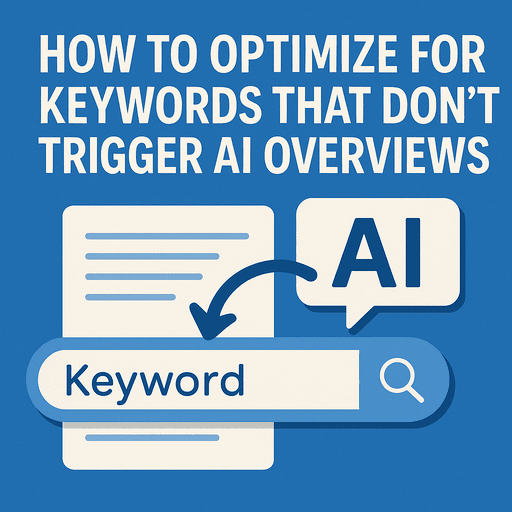How to Optimize for Keywords That Don’t Trigger AI Overviews

Short Answer: The keywords least likely to trigger AI Overviews are commercial and transactional terms, local business queries, and niche or brand-specific long-tail searches. For these, the SERP is still wide open for traditional SEO. Titles, schema, and intent-matched content can win rankings without competing against a generative box.
Introduction
Imagine two very different search experiences. One query pulls up an AI Overview, a neat, boxy summary stitched together from multiple sources. Another query shows you the old-school SERP: ads up top, a map pack, and organic listings. No AI box in sight.
Most marketers obsess over the first scenario, scrambling to figure out how to optimize for AI Overviews. But the second scenario is where the real, underutilized opportunity lives. These are the non-AI keywords, the queries where traditional SEO still rules the day. And if you can spot them, you can win big.
Why Commercial Keywords Are Safer from AI Overviews
The Semrush AI Overviews Study found that 88% of AI Overviews appear on informational queries, while transactional queries made up only 2.9% and navigational 1.7%. In other words, when users are ready to buy, compare products, or click ads, Google usually avoids AI summaries.
Another clue: only 5% of SERPs with AI Overviews also contained PPC ads. That means monetized queries are still dominated by Shopping ads, PPC, and organic listings, not AI.
Why Local Queries Rarely Trigger AI Overviews
Think of searches like “plumber Port Jervis NY” or “coffee shop near Hudson Valley.” Users want a map, reviews, and directions — not a generative paragraph.
Semrush’s study reinforces this by showing AI Overviews are heavily skewed to informational queries, not geo-modified ones. Local SERPs still prioritize the map pack, reviews, and Google Business Profiles, which makes local SEO a prime arena for non-AI keyword wins.
Why Niche and Long-Tail Queries Avoid AI Summaries
AI Overviews are more common on lower-volume informational searches, but when it comes to ultra-specific or brand-driven queries, the AI often doesn’t appear.
Examples:
- 2026 Honda Passport towing capacity kayak trailer
- natural hair growth honey review
- Built by Bees apple cider shrub
These types of queries either lack enough data for AI confidence or lean so heavily into brand and product specifics that ads and organic pages do the heavy lifting.
How to Optimize for Non-AI Keywords
- On-page precision: Write titles that match search intent exactly. Align H1s. Build out descriptive meta descriptions. Add schema.
- Depth and clarity: Don’t make users hunt for answers. Use structured sections, bullet points, and short FAQs to capture both quick and deep intent.
- Local authority: For geo queries, double down on Google Business Profile optimization, review generation, and LocalBusiness schema.
- Conversion-focused design: Build landing pages that close the loop with pricing tables, feature comparisons, and reviews.
- Entity optimization: Explicitly connect products, people, and places in your content so Google can map you into its knowledge graph.
Keyword Strategy Map for Non-AI SEO
- Commercial: “buy 2026 Honda CR-V near me,” “Samsung Galaxy S25 vs iPhone 16 Pro,” “best mattress deals 2025”
- Local: “plumber Port Jervis NY,” “coffee shops near Hudson Valley,” “Savannah GA Black Friday car sales”
- Niche/Long-tail: “2026 Honda Passport towing capacity kayak trailer,” “natural hair growth honey review,” “optimize blogs for keywords without AI overviews”
FAQ: Optimizing for Non-AI Keywords
How do I confirm if a keyword avoids AI Overviews?
Search it directly, track over time, and note consistency.
Are commercial queries less likely to trigger AI Overviews?
Yes. Semrush’s dataset shows transactional under 3% of AI Overview-triggering queries, while informational made up the vast majority.
Do ads affect AI Overview visibility?
Yes. Only 5% of AI Overview SERPs also contained PPC ads, suggesting Google avoids mixing them.
If a query sometimes shows an AI Overview, should I skip it?
Not necessarily. AI Overviews are short (avg. 119 words) and overlap with top-10 organic links only about 20–26%. Well-structured content can still win clicks.
Conclusion: Play Where AI Isn’t
Some queries trigger AI answers. Many do not. By steering toward commercial, local, and niche long-tail searches, you can build predictable rankings and conversions while competitors chase generative boxes.
The smartest SEO strategies in 2025 will master both: optimizing for AI Overviews and doubling down on the keywords where Google still relies on us.
Want help finding these opportunities in your niche? Schedule a Non-AI Keyword Research Audit with me today and let’s future-proof your SEO.

0 Comments Add a Comment?